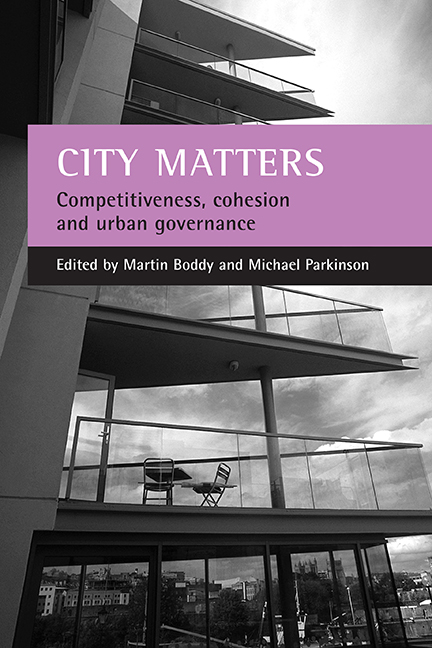Book contents
- Frontmatter
- Contents
- List of tables and figures
- Foreword
- Acknowledgements
- Notes on contributors
- one Introduction
- Part One Competitiveness, cohesion and urban governance
- Part Two Competitiveness and urban change
- Part Three Competitiveness, innovation and the knowledge economy
- Part Four Housing, property and economic performance
- Part Five Space, place and social cohesion
- Part Six Ethnicity, enterprise and social cohesion
- Part Seven Leadership, governance and social capital
- Conclusions
- Index
five - London: competitiveness, cohesion and the policy environment
Published online by Cambridge University Press: 20 January 2022
- Frontmatter
- Contents
- List of tables and figures
- Foreword
- Acknowledgements
- Notes on contributors
- one Introduction
- Part One Competitiveness, cohesion and urban governance
- Part Two Competitiveness and urban change
- Part Three Competitiveness, innovation and the knowledge economy
- Part Four Housing, property and economic performance
- Part Five Space, place and social cohesion
- Part Six Ethnicity, enterprise and social cohesion
- Part Seven Leadership, governance and social capital
- Conclusions
- Index
Summary
Introduction
For its sheer scale, the wide array of service activities in which it possesses competitive advantage by both national and international standards, and for its cosmopolitanism and international connections, London clearly stands out among British cities. It is also, in simple terms that can too easily be lost sight of in an era of self-conscious globalisation, the national capital of the UK: economically, socially and culturally, as well as politically. As such, it plays a crucial role in the British urban system, with important implications, both complementary and competitive, for the way in which other city-regions can function and develop. Understanding how its role and performance are evolving in the new kind of intense internationally competitive economic environment that has been emerging over the past 20 years or so, has an importance that goes well beyond both the rather privileged areas of south east England, or what it has to show about the development of ‘global cities’.
The things which make London most distinct in a British context, however, namely its sheer scale and diversity, both physically and in population terms, also mean that an unusually wide cross-section of urban situations, environments and issues can be found (and observed) somewhere within its functional region. Often this is on a scale which makes them more visible, statistically and politically, than in smaller places. There are obvious exceptions in that London had little of the kind of heavy industries, whose demise has been so traumatic in many northern cities, and has benefited from the general strength of the southern regions since the 1920s. Comparison with Glasgow, Liverpool and Manchester in particular among cities studied in this programme highlights ways in which these basic regional economic and structural facts matter. But equally, a London study can display rather clearly a number of processes which are underway in some parts of (or affecting some groups in) all city-regions, producing similar kinds of outcome and giving rise to what may be very similar policy issues.
The research reported here, like that of the Bristol, Liverpool–Manchester and Edinburgh–Glasgow teams (see Chapters Two to Four of this volume), was designed to be ‘integrative’, rather than to be focused on a specific theme or activity (as projects reported in the remaining chapters of this volume are).
- Type
- Chapter
- Information
- City MattersCompetitiveness, Cohesion and Urban Governance, pp. 71 - 90Publisher: Bristol University PressPrint publication year: 2004



